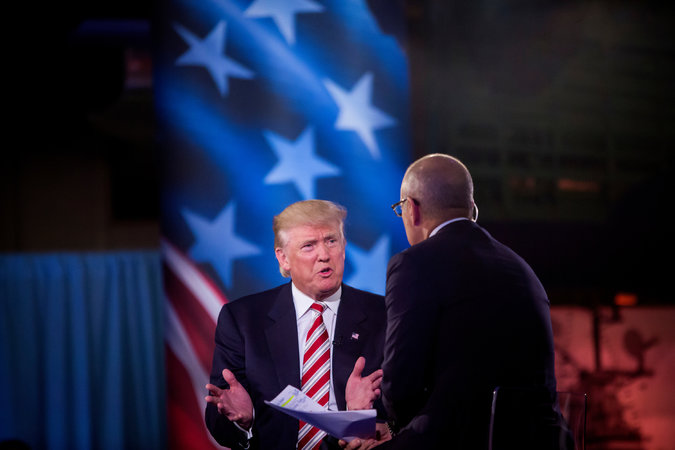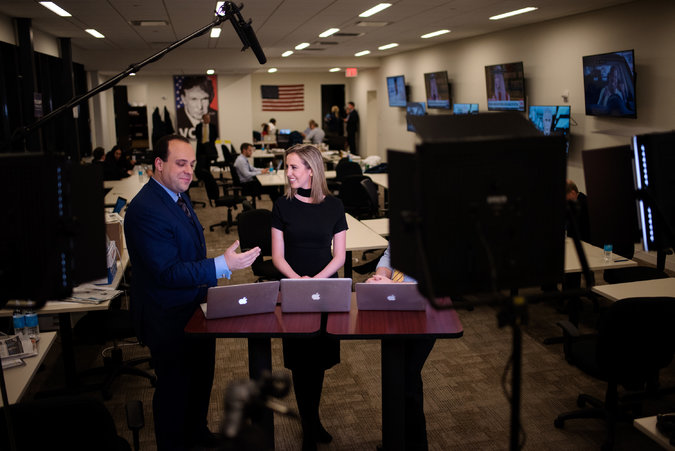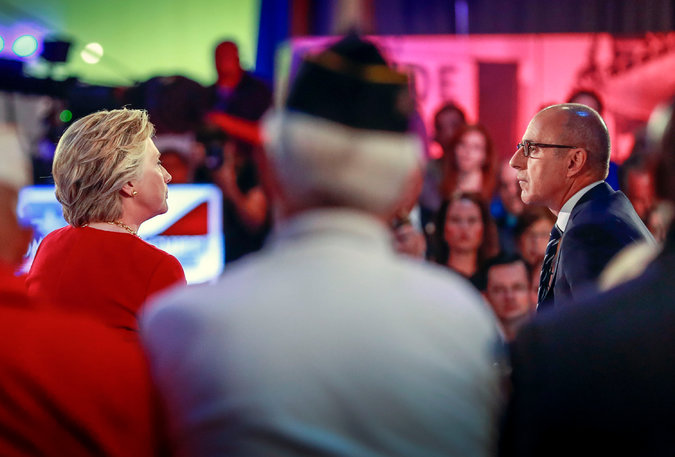RUTENBERG We talked about those Trump rules yesterday, and as I said then, it turns out the Trump rules were really just plain old journalism rules: Collate what’s true from what’s false; analyze, contextualize, dig, dig, dig — for scoops and hidden details (and hopefully not your own grave!).

PONIEWOZIK And do it without regard for how it makes you look to one camp or another.
RUTENBERG The new twist was that we had an asymmetry no working journalist had ever seen. Donald J. Trump lied more than his opponent did. It meant that the press was seen calling him out for falsehoods more than it was seen calling out Hillary Clinton, who fibbed less (but did aplenty). That created the impression of imbalance. But so much of it was reflecting what the reporting found, objectively. For instance, last week, when Mr. Trump described a scene in which President Obama verbally attacked a pro-Trump protester at a rally when Mr. Obama had clearly, in fact, argued the protester deserved respect and a hearing, well, that called for a robust fact-check. I mean, reporters have eyes.
That doesn’t mean Hillary Clinton got a pass. When she referred to half of Mr. Trump’s supporters as hailing from a “basket of deplorables,” it was widely aired. The Times broke the story that she was keeping a private email server at her home in Westchester, New York. The media covered the WikiLeaks emails from her adviser John Podesta in ways that produced a fair share of rough headlines for Mrs. Clinton; scrutinized pay-to-play optics at the Clinton family’s foundation, and examined her record on Libya and Syria with an eye on what she’d do as president.
Advertisement
Continue reading the main story
PONIEWOZIK The press covered Hillary Clinton like the next president of the United States. The press covered Donald Trump like a future trivia question (and a ratings cash cow).
From the get-go, too much coverage of the race has been informed by a belief, overt or unconscious, that Mr. Trump couldn’t win. Last fall, the political press, like their sources, dismissed the polls and stuck to the belief that people would never actually pull the lever for that man. The mind-set stuck well into the primaries — even data-minded Nate Silver succumbed to the siren call of punditry.
RUTENBERG Yes, If you think about it, she received coverage befitting a traditional politician running for president; he received coverage of a billionaire reality-television star who turned politics into performance art and sparked a powerful movement in the process.
PONIEWOZIK And in the general election, it affected expectations. NBC’s September “commander-in-chief forum” with Matt Lauer [of “Today”] was a low point. Mrs. Clinton got an appropriately tough vetting. Mr. Lauer told Mr. Trump “nobody would expect you” to have studied up on foreign policy before running. (Nobody? Do they cover that at orientation?)

It’s not as simple as, “the press went easy on him.” In some ways this made for devastating or dismissive coverage. But only one candidate was treated like she might be elected, set policy and make appointments.
RUTENBERG One thing lost in that whole controversy — Mr. Lauer and Mr. Trump were once related by corporate synergy. (Which makes them, what, corporate media cousins?) “Today” used to regularly run segments on the previous night’s edition of “The Apprentice.” So here was Mr. Lauer having to switch from asking Mr. Trump about Omarosa’s antics to those of President Bashar al-Assad of Syria. And I bet this threw him. Still, your point stands.
PONIEWOZIK Yes. My biggest piece of advice for covering a candidate like Donald Trump: Just pretend he’s the Republican nominee for president. Within the bubble of conventional wisdom, this didn’t happen enough.
RUTENBERG I was struck by how many times I saw prominent journalists say, “Gee, I don’t know anybody who would vote for Mr. Trump, I’m going to have to work on that,” or some such. Take it from me — having friends who supported Mr. Trump from early on didn’t mean you were going to expect him to win the Republican nomination. But there was without question a big disconnect between mainstream reporters and Trump supporters (and a segment of Bernie Sanders supporters, too, for that matter).
Advertisement
Continue reading the main story
And this will be key in the days, months and years ahead. The press needs to explore the frustration of those many Americans who think free trade’s gone too far; that immigration threatens the national fabric; and that insiders from Washington, Wall Street and the media have rigged the system against them.
PONIEWOZIK This election has exposed a lot of bubbles. Chuck Todd this morning writes that if coastal journalists were more in touch with economically hard-hit areas, they’d have seen the Trump phenomenon coming. As a southeast Michigan native, I’ll give him that. But I would add that a more diverse press corps would have been less likely to deflect so much of the overt racism, misogyny and anti-Semitism on the campaign trail as “economic anxiety.” And it wouldn’t be so quick to equate “working class” with “white.”

RUTENBERG I think that’s right, in that the press corps’ lack of diversity — not only in terms of race but also class perspective — left it blind to the power of the movement that carried Mr. Trump to the nomination. That said, I think that to the extent that the Trump campaign surfaced pockets of racism, anti-Semitism and misogyny, the news media did a good job calling that out for what it was, which doesn’t come naturally.
Either way, this will be a real wasted opportunity if there isn’t a lot of probing, fearless reporting about how much racism, misogyny and anti-Semitism exist in the culture. It has surfaced. Let’s not let the rug roll back over it all when this is done.
That brings me to this question: When this thing wraps, do you think the mainstream media will revert to where it was before this campaign started, treat this as one nightmare it would just as soon forget? Or does it emerge forever changed?
Because whatever you say about this year’s election coverage, it killed at the box office.
PONIEWOZIK The drive for ratings and clicks will not change, whatever anyone says. Jeff Zucker recently said maybe the network should not have aired so many of Mr. Trump’s rallies unedited.
I take these morning-after regrets the same way I do a political party’s postelection autopsy. Wake me up if they ever implement it.
Another looming question about the postelection media is if Mr. Trump will be a player in it. Especially if he loses, I’m dubious of Trump TV as a full-fledged cable channel. That’s expensive — an online subscription service might be an easier way to cash in. That, and that brand depends on his image as a winner. In defeat, even claiming a rigged election, he may be a tougher sell.
But who says Trump TV would only be a thing if Mr. Trump loses? A President Trump would make aggressive use of the media. Why not his own de facto state TV? What would stop him: his deep respect for the norms of political propriety?
Continue reading the main story
Article source: http://www.nytimes.com/2016/11/09/arts/television/after-this-election-can-the-media-recover.html?partner=rss&emc=rss
Speak Your Mind
You must be logged in to post a comment.